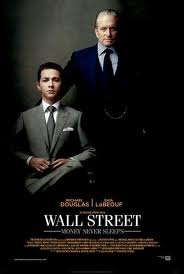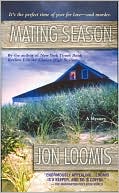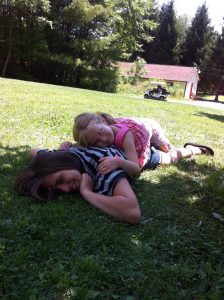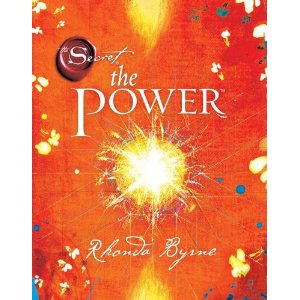
My rascally and delightful middle daughter wanted some daughter-mom time, so we went together to see EAT, PRAY, LOVE. I haven’t read the book. The movie was charming, often poignant, touching enough to forgive the places where it was too facile. Julia Roberts was wonderful in the lead role. What could be more delectable than staring at creamy warm spaghetti carbonara, or more uplifting than watching a seeker wrestle honestly with the Guru Gita, or more heart-warming than watching love come to a supplicant studying with a Balinese priest?
It left me with a feeling of longing, for the quests I can not take. When Liz/Julia rented her apartment in Rome, I leaned over and whispered to my daughter, “That’s what women who aren’t mothers get to do.” Her big eyes widened: she hadn’t considered such a thing, hadn’t anticipated that I would articulate it.
So I had some envy, too. I had my oldest daughter twenty years ago, and my littlest is only 5. I will be almost 60 when she goes off to college! Here I am, with wanderlust in my soul and my passport always in my purse, just in case today I get to fly to Paris or Sydney…
Yet I have remained faithful to my commitment to be a present and caring mother. Not a perfect mother. That was never my goal. But present, loving, supportive, caring, involved: that was my goal as a mother. To be someone whom my children know they can depend on. When they’ve had mono and Swine flu and bad grades and drug issues, I’ve been there. When they need to hear a lecture about the importance of writing thank you notes or of following through on promises or of doing the right thing when their peers are operating otherwise, when they need to hear a pep-talk because the latest poor choice in guys has dumped them, when they need to hear that they are loved and valuable no matter what–I’m there. If they ever get Ebola or a divorce or need a kidney, I’ll be there, to nurse them or give them my kidney. I never had that kind of support so I made damn sure my children did. From me.
Of course, it matters little to them right now. The older ones are entangled in teenage stuff of great importance: separating, provoking, blaming, individuating. They want to assume adult prerogative without taking on the responsibility that goes along with it. They don’t want to think about the impact of their actions on the people around them. The little one is in that blissful “mommy is wonderful” stage, but she has a cussed independent streak ten kilometers wide. I’ve been around the block. I know where that will lead. They have charmed lives and don’t know it. I haven’t done everything right as a mother–why should I have to?–but I’ve been true to this commitment: to be there for them.
Which often means that I haven’t been able to be there for myself. There’s a kind of …noxious myth… toxic fantasy… of post-liberation feminism that women can have it all: sexy loving marriage, children, dynamic career, fulfilling friendships, self awareness, a full night’s sleep. How awful to scourge ourselves with this chicanery. Was this what our mothers and grandmothers intended, when they battled for us to have equal pay for equal work, and the right to choose which work we want to do?
I have made choices. Other things came second because my children come first. I have a friend who made zillions of dollars and is raising two kids; she is scornful when I say that I would have written more books if I hadn’t had children. But there are things in her life I wouldn’t wish on my worst enemy. Let her turn her nose up.
So I’ve done what questing I can, internally. I’ve made the trips I can, abbreviated though they are. I’ve explored every possible avenue I can, under the constraints that I’ve taken on. Love is not merely a big oceanic feeling. It’s not just the deep erotic merging with a romantic soul-mate–though I enjoy both of those facets of love. Love is also the dignity of steadfastness. It’s waking up every morning to a daily grind of commitment and responsibility, and still finding something to laugh about and enjoy.
I couldn’t love a man that way, but I do love my children that way. And what I’ve learned is that I must love them that way without any expectation of gratitude or acknowledgment. Because chances are, no matter what a mother does for her children, they will not appreciate it. At least at certain stages of their lives. This is why I’ve come to revere the Bhagavad Gita: “Do the best you can and release the outcome.”
An old friend of mine periodically sends me emails… Meet me in Maine, meet me in Budapest. As if I weren’t married. As if I weren’t tempted. As if I didn’t enjoy my time with him enough to consider it rather wistfully. But it’s not even about him. If I ran off to Bali by my lonesome, would I find a hot young guy to get naked with in the water, or a soul-stirring companion like gorgeous Javier Bardem?!?
But this week, as my husband and my littlest daughter and the dog and I drove to Cape Cod, and the dog freaked out and my husband had to remove him from behind the car seat and doing so, ripped his (husband’s) fingernail completely off his finger, and so I had to drive, which became 8 hours in traffic with my daughter barfing and my husband bleeding profusely and criticizing my driving, I thought to myself, Good times. Would I trade this life for Eat, Pray, Love?
The answer was, Maybe. And then, later on, when my husband’s finger finally stopped oozing crimson goo and he kissed me and thanked me for my patience, and my sweet little one wove her arms around me and told me I was the bestest in the whole world, and we ran along the Cape Cod Bay laughing as the dog chased seagulls, and then when the aforesaid husband and daughter got into an indignant argument that tickled my appreciation for the absurd so I couldn’t stop laughing–the answer was: Maybe not.








